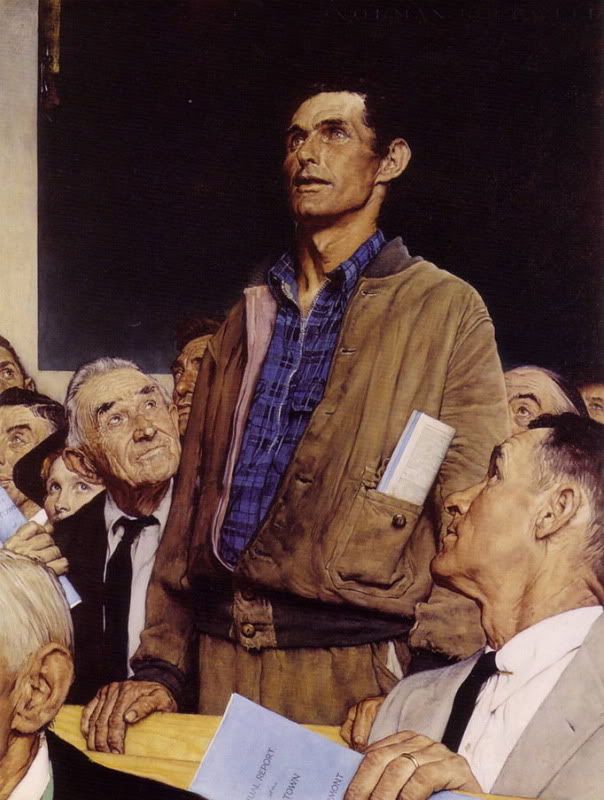Desperate times
"If you have something that you don't want anyone to know, maybe you shouldn't be doing it in the first place. If you really need that kind of privacy, the reality is that search engines—including Google—do retain this information for some time and it's important, for example, that we are all subject in the United States to the Patriot Act and it is possible that all that information could be made available to the authorities." - Eric Schmidt
As the debate over web anonymity escalates, I notice a dynamic that will be familiar to the First Sea Lord - the defense of basic human rights requires defense of some less-than-attractive people - but the alternatives are gruesome.
By basic human rights, I mean the ability to engage in political discourse without (much) fear of retaliation by the rich and powerful. This is always problematic, but modern American politics is now literally run by billionaires (not just the Koch brothers, but also people like Soros and Jobs on the left), so, as Mr. Dylan noted in another context, public officeholders have got to serve somebody.
I was never more wrong about anything than I was in my rejection of Jerry Brown in 1992. He said what was happening and what would happen. Well, that was the last shot. The idea of standing up and saying your piece, and having it matter in any actual sense, is really just nostalgia now.
"I think poor people should be able to get medical care"

You won't see that picture, because rich people hire stooges to do this sort of thing.
The problem with plutocracy is that billionaires are uniquely well-equipped to shut people up. If you say something actually damaging, and they know who you are, they can make a quick assessment of whether to ignore you, buy you off, or have you killed. [UPDATE: Or discredited. I forgot discredited.] In my lifetime the prospects for legitimate dissent from the bottom of the economic spectrum have dwindled down from bad to about zero.
And America's a picnic, of course, compared to China, where political dissent can be a fast track to organ donation.
So I'm not surprised that there are powerful people who figure the whole concept of anonymous comment should be done away with. Zuckerberg leads the charge.
But anonymous comment has been a longstanding and important part of the political process, going back to the Revolutionary War, and of course in England long before that. (Google's systematic indexing of the world's libraries allows me to directly link to a book discussing this phenomenon here.)
There was a time when these things called "blogs", many with anonymous authors, wielded considerable influence, but these have now been largely consolidated and subsumed into corporate power structures. (The Huffington Post writer's boycott list uses Facebook, by the way.)
Eisengeiste itself is, of course, controlled by a shadowy cabal of politically well-connected west coast intellectuals with interests and agendas of their own.
So I think anonymity is important if we wish to preserve this idea of freedom of dissent - I don't see how the concept is viable if Zuckerberg or Schmidt can retaliate against you, either of their own volition or at the direction of the government. Given the importance of the issue, one could wish for a more distinguished champion than Christopher Poole, but I guess that's the point. You either believe in freedom of expression, or you don't. If you have to put up with 2 Live Crew, so be it.
I've noticed over the years that it has become much more difficult to create an online persona - without giving up your real identity. Most online e-mail services want a "real" e-mail address now, and, in the case of Google, your phone number. In the old days you could spoof them pretty easily. But Pookmail is no more, and the grinding wheels of commerce are killing off, one by one, the dodgy portal sites that once offered a place to get a hot shower and a beer. Even Lycos - once the open city of the Internet - is changing its model. At this stage there's hardly anyone quasi-respectable who is desperate enough to offer you an e-mail address if they have no idea who you are. Other than Microsoft, I mean.
These are desperate times. The ranks are thinning, and the safe houses few and far between.


1 Comments:
A fine essay.
China or Russia are the new models, the rise of oligarchies: the destruction of privacy serves that end perfectly. That we are not being bundled off in vans, for the most part, is that out culture, no longer our law or our practices, still values individual autonomy.
So why do I defend the administration when there are any number of Obama policies push against these beliefs.
Again: this Administration has given us, against a psychotic backlash, the practical hope of returning to the basic rule of law pissed away so completely during the Bush years. Chris Dodd would have been up for that, but...
Respect for law and the somewhat fading habits of a free people's culture are the only things protecting us from oligarchs.
The thing about Zuckerberg is that he seems to runs his organization much like any tin-horn oligarch would. I get the impression he would be delighted - DELIGHTED- to sell out everyone who trusted, foolishly, his claims to protect their information to whatever skull-sucking dictator would pay top price for a list of most eligible victims, if it didn't disrupt the public perception necessary for his business model
When you hear privacy doesn't matter, try replacing that word with "autonomy." They amount to something very similar.
Post a Comment
<< Home